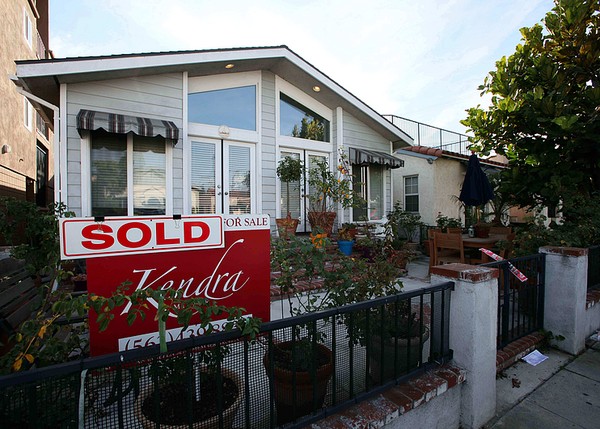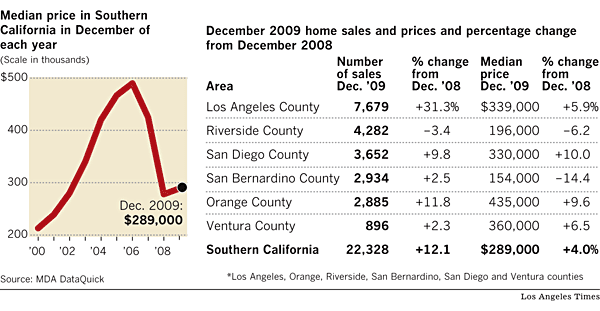In a typically sluggish month, the median sale price rises 4% over the same period a year earlier, and sales jump 12.1%. The pace of sales is the best since 2006, aided by tax credits.
By Alejandro Lazo
January 20, 2010

Rock-bottom interest rates and stronger sales in higher-priced neighborhoods helped Southern California's housing market post robust gains in the typically sleepy month of December, new data show, and experts say the momentum is continuing -- ushering in an early start to the spring home-buying season.
The median price paid for a Southland home rose 4% to $289,000 last month from December 2008, the first time the closely watched figure has posted a year-over-year gain since the region's real estate market took a nose dive 2 1/2 years ago, according to data released Tuesday by MDA DataQuick, a San Diego real estate research firm.
Rebounding home prices could help the Southern California economy recover from its slump, as a stronger housing market could lead to hiring on construction sites and in real estate sales, title and escrow offices, said Esmael Adibi, director of Chapman University's A. Gary Anderson Center for Economic Research.
"The worst is behind us for sure," he said. "For the economy, the implication is, at least on the residential side, we don't expect more layoffs, and you might actually see some pickup in employment."
But Adibi noted that those gains could be tempered by continued weakness in the commercial real estate market, which includes office buildings, retail centers and hotels.
The increase in December home prices follows a dismal 2008. Even with the rise, the median price was still 42.8% lower than its $505,000 peak during several months in 2007, underscoring the steep decline in the latter part of the last decade. The median is the point at which half the homes sold for more and half for less.
Still, December's sales pace was the best since 2006, capping a year in which strong government support of the housing market helped stabilize prices for most of the last year and brought more buyers back into the market.
"It's time for me to move," said Soosan Saedi, 43, who is looking to sell her three-bedroom, 1,300-square-foot Woodland Hills house and trade up to something bigger. "I need the space, the mortgage rates are low, and fortunately I am not having trouble with loans, so it is time for me to buy."
The housing market's recovery began last year as first-time buyers and investors competed for steeply discounted foreclosed homes. Now foreclosure properties are making up a smaller part of the mix. The gains in December also reflect a more diverse market, experts said, as prices were bolstered by increased sales in many mid- to high-priced communities.
Part of that trend shows the increased affordability of high-end properties as more are taken back by banks or are sold "short," for less than what is owed on their mortgages, real estate professionals said.
"They have come down a lot," said Syd Leibovitch, president of Rodeo Realty in Bel-Air. "I think the sellers dug in for a while, and now they are accepting the reality that prices have dropped, and they are being a lot more flexible."
Beverly Hills, Santa Monica and Newport Beach were among the affluent areas notching healthy sales gains, according to DataQuick. Conversely, areas hard hit by foreclosures -- including Moreno Valley, Lake Elsinore and Palmdale -- saw a drop-off.
Christopher Cortazzo, a Coldwell Banker agent in Malibu, said he sold a home for $12 million in December, roughly $3 million below its listing price, and closed out the month with $26.5 million in sales, one of his best months of the year. Cash-rich buyers looking to capitalize on lower prices have rushed into the market in recent weeks, he said, and the sales pace has continued through January.
"Spring season is going to start early," Cortazzo said. "We are having a lot of cash deals, so there is a lot of money out there, and there is amazing opportunity and great deals to be had."
One thing driving sales is the April 30 expiration of tax credits for home buyers. First-time home buyers can get up to $8,000 in credit on their federal income taxes, and current homeowners can qualify for up to $6,500.
Low mortgage rates are also a factor. Thirty-year fixed-rate loans were below 5% through most of December and haven't risen much.
The role of the federal government in the housing market remains key. Some experts worry that once certain policies and programs wind down -- among them low interest rates, tax incentives for buyers and an increased accessibility of mortgages backed by the Federal Housing Administration -- the housing market could falter.
Christopher Thornberg, principal of Beacon Economics, predicts home prices will drop once those policies and programs expire.
"The bounce in the housing market is due to government policy, not due to fundamentals," he said. "None of these programs fix the underlying problem. They only delay the solution -- they only delay the healing process."
The percentage of Southern California homes that sold for more than $500,000 rose to 20.2% of all sales in December from 16.5% a year earlier, DataQuick said. That is well off the 52% level reached before the credit crunch hit in 2007, which made large mortgages difficult to obtain.
Richard Green, director of the USC Lusk Center for Real Estate, said buyers have sensed more security in Southern California's real estate market in recent months and have begun to get off the fence.
"We are getting a little bit of what we had six or seven years ago, where people are worried if they don't get in now they are going to miss out on an opportunity," Green said. "In a decent neighborhood, in the half-a-million-dollar range, we are back to lots of offers."
A total of 22,328 new and resale homes sold last month in Los Angeles, Riverside, San Diego, Ventura, San Bernardino and Orange counties, up 16.4% from November and 12.1% from December 2008, DataQuick said.
Still, uncertainty lingers. Unemployment and a potential wave of homes headed for sale because of foreclosure or delinquency loom over the U.S. housing market. Both could slow Southern California's progress toward recovery should the Obama administration fail in its efforts to aid struggling borrowers. California's budget woes could also bode poorly for the state.
"The fiscal picture is still really bleak, and that makes me worry," Green said.
The home-buyer tax credit motivated Jennifer Scholte, 31, to close on a Lakewood home in December. The teacher said she and husband Eric, 34, saved up for a 20% deposit on the $361,000 property.
"We are first-time home buyers, and with that credit, that was a big push," she said.

|


